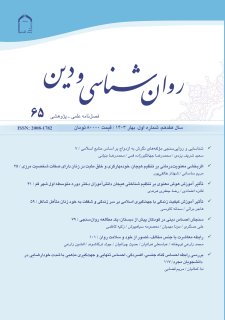نویسندگان:
سمانه کاوسی
/ کارشناسارشد مشاوره آموزش عالی المهدی مهر- واحد اصفهان
صفحهها:
59-78
تاریخ دریافت: 1401/05/09
تاریخ پذیرش: 1401/09/06
چکیده:
پژوهش حاضر با هدف بررسی تأثیر آموزش کیفیت زندگی با جهتگیری اسلامی بر سرزندگی و شفقت به خود انجام شد. برای این پژوهش که از نوع نیمهتجربی است، از بین کلیه زنان متأهل شاغل شهر شهرضا با استفاده از روش «نمونهگیری در دسترس» 30 تن انتخاب شدند و به شیوه تصادفی در دو گروه آزمایش و گواه بهطور برابر قرار گرفتند. هر دو گروه در پیشآزمون و پسآزمون پرسشنامه «سرزندگی» رایان و فردریک (1997) و «مقیاس شفقت به خود» نف (2003) را پاسخ دادند. گروه آزمایش طی ده جلسه 90 دقیقهای، تحت آموزش «کیفیت زندگی اسلامی» IS-QOLT)) قرار گرفت. دادهها با استفاده از نرمافزار spss-23 و آزمون آنکوا تجزیه و تحلیل شد. یافتهها نشان داد میانگین نمره سرزندگی و شفت بهخود در پسآزمون برای گروه گواه کمتر از میانگین گروه آزمایش است. بنابراین آموزش کیفیت زندگی با جهتگیری اسلامی اثر معناداری بر افزایش سرزندگی (05/0>p) و شفقت به خود (05/0>p) در گروه آزمایش داشته است. بر اساس یافتهها، به زنان، بهویژه زنان شاغل توصیه میشود که با یادگیری چگونگی افزایش کیفیت زندگی با جهتگیری اسلامی سرزندگی و شفقت به خود را افزایش دهند.
Article data in English (انگلیسی)
Title:
The Effect of Teaching Quality of Life with an Islamic Orientation on the Vitality and Self-Compassion of Working Married Women
Abstract:
This study is conducted to investigate the effect of Islamic-oriented quality of life education on vitality and self-compassion. Thirty people were selected from all the working married women in Shahreza for this research, which is a semi-experimental research, using the "accessible sampling" method; they were randomly divided into two experimental and control groups. Both groups answered Ryan and Frederick's “Vitality” Questionnaire (1997) and Neff's “Self-Compassion Scale” (2003) in the pre-test and post-test. "Quality of Islamic Life" (IS-QOLT) was taught to the experimental group during ten 90-minute sessions. The data was analyzed using spss-23 software and ANCOVA test. According to the results, the average score of vitality and self-compassion for the control group is lower than the average of that in the experimental group in the post-test. Therefore, teaching quality of life with an Islamic orientation has a significant effect on increasing vitality (p
References:
- نهجالبلاغه.
- ارقش، محمد و کبری حاجی علیزاده، 1396، «بررسی رابطه بین شفقت به خود و کیفیت زندگی دانشجویان زن»، در: سومین همایش تازههای روانشناسی مثبت نگر، بندرعباس.
- آمدی تمیمی، عبدالواحد، 1429ق. غرار الحکم و درار الکلم، تصحیح سیدمهدی رجایی، قم، مؤسسه دارالکتب الاسلامی.
- جزایری، رضوان السادات و همکاران، 1395، «رابطه سلامت خانواده اصلی و شفقت به خود با تعهد زناشویی»، مجله دانشگاه علوم پزشکی مازندران، ش 139، ص 137-148.
- حسنی، سعدالله، 1389، نقش باورهای دینی در اصلاح فرد و جامعه، قم، بوستان کتاب.
- حمید، نجمه و همکاران، 1392، «اثربخشی آموزش مهارتهای کیفیت زندگی به شیوة گروهی در شادکامی وسرزندگی سالمندان مرد شهر اهواز»، مطالعات علوم پزشکی ارومیه، ش 24، ص 800-811 .
- خسروی، صدالله، و همکاران، 1392، «بررسی کفایت روانسنجی مقیاس شفقت به خود»، روشها و مدل های روانشناختی، ش 13، ص 47-59.
- سیفی گندمانی، محمدیاسین و همکاران، 1395 الف، «الگوی اسلامی رواندرمانگری/آموزش با بهبود کیفیت زندگی»، روان شناسی و دین، ش 51، ص 55-68.
- سیفی گندمانی، محمدیاسین و همکاران، 1395ب، «اثر بخشی روان درمانگری اسلامی با کیفیت زندگی بر افسردگی وکیفیت زندگی دانشجویان (دختر و پسر) افسرده دانشگاه پیام نور استان چهارمحال وبختیاری»، طلوع بهداشت یزد، ش 55، ص 224-239.
- سیفی گندمانی، محمدیاسین و همکاران، 1400، «اثربخشی آموزش مبتنی بر کیفیت زندگی با جهت گیری اسلامی بر خودکارآمدی و شادکامی دانش آموزان»، روانشناسی و دین، ش 53، ص 55-68.
- شمسایی، مهدی، ۱۳۹۲، شادی و نشاط، تهران، شهر.
- طغیانی، مجتبی،1390، اثربخشی درمان گروهی با کیفیت زندگی بر سلامت روانی، بهزیستی ذهنی و عملکرد تحصیلی، کارشناسی ارشد روانشناسی بالینی، اصفهان، دانشگاه اصفهان.
- عبداللهزاده، سیدمحمد، 1393، گفتار معصومین، چ سوم، قم، امام علیبن ابیطالب(ع).
- عبدالهی، فهیمه و علیرضا محمدپور، 1392، «بررسی کیفیت زندگی سالمندان مقیم در منزل و سرای سالمندان در شهرستان ساری»، علوم پزشکی مازندران، ش 23، ص 20-25.
- فریش، مایکل. بی،1390، روان درمانی با بهبود کیفیت زندگی، ترجمة اکرم خمسه، تهران، ارجمند.
- فقیه، محمدباقر، محمدعلی سرلک، 1400، «ارائه چارچوب سه شاخگی سرزندگی سازمانی»، علمی مدیریت سازمانهای دولتی، ش 9، ص 41-54.
- کشاورز، امیر، و همکاران، 1387، «رابطه بین سرزندگی و ویژگی های جمعیت شناختی با شادکامی در مردم شهر اصفهان»، مطالعات روانشناختی، ش 4، ص 45-64.
- گال، مردیت و همکاران، 1398، روشهای تحقیق کمی و کیفی در علوم تربیتی و روانشناسی، ترجمة احمدرضا نصر و همکاران، تهران، دانشگاه شهید بهشتی و سمت.
- مردانی نوکنده، محمدحسین، 1391، «چیستی و ماهیت شادی در قرآن و روایات و راهکارهایی برای شاد زیستن»، حبل المتین، ش 1(1)، ص 35-62.
- ملکمحمدی، فاطمه، 1396، اثر بخشی آموزش با کیفیت زندگی با جهتگیری اسلامی بر خود کارامدی،شادکامی، تابآوری وکیفیت زندگی دانش آموزان دختر دبیرستان های مقطع متوسطه دوم بروجن، کارشناسی ارشدروانشناسی عمومی، بروجن، دانشگاه آزاد اسلامی واحد بروجن.
- یزدانی، محمد رسول، خدامراد مومنی، 1395، «نقش سبک زندگی و تابآوری در پیش بینی سلامت روان و خود شفقت به خود دانشجویان دانشگاه رازی کرمانشاه»، تحقیقات بالینی در علوم پیراپزشکی، ش 2، ص 115-124.
- Anjum, M. A, Liang, D, Durrani, D. K, & Parvez, A, 2020, "Workplace mistreatment and emotional exhaustion: The interaction effects of self-compassion", Current Psychology, No. 41(3), p. 1460–1471, https://doi.org/10.1007/s12144-020-00673-9
- Beaumont, E, Durkin, M, Martin, C. J. H, & Carson, J, 2016, "Compassion for others, self-compassion, quality of life and mental well-being measures and their association with compassion fatigue and burnout in student midwives: A quantitative survey", Midwifery, No. 34, p. 239-244, doi:10.1016/j.midw.2015.11.002
- Brophy, K, Brähler, E, Hinz, A, Schmidt, S, & Körner, A, 2020, "The role of self-compassion in the relationship between attachment, depression, and quality of life", Journal of affective disorders, No. 260, p. 45-52.
- Browne, R. K, Duarte, B. A, Miller, A. N, Schwartz, S. E, & LoPresti, J 2022, "Racial Discrimination, Self-compassion, and Mental Health: the Moderating Role of Self-judgment", Mindfulness, Vol. 13, 1994-2006, https://doi.org/10.1007/s12671-022-01936-1
- Deneulin, S, 2011, "Revisiting Religion: Development Studies thirty years on", World Development, Vol. 39, Issue. 1, 45-54, https://doi.org/10.1016/j.worlddev.2010.05.007
- Dreisoerner, A, Junker, N. M, & Van Dick, R, 2021, "The relationship among the components of self-compassion: A pilot study using a compassionate writing intervention to enhance self-kindness, common humanity, and mindfulness", Journal of Happiness Studies, No. 22(1), p. 21-47.
- Dutton, J. E, Workman, K. M, & Hardin, A. E, 2014, "Compassion at work, Annual Review of Organizational Psychology and Organizational Behavior, Vol. 1(1), p. 277-304, https://doi.org/10.1146/annurev-orgpsych-031413-091221
- Dyrenforth, P. S,Kashy, D. A, Donnellanfr, M. B, Lucas, R. E, 2010, "Predicting relationship and life satisfaction from personality in nationally representative samples from three counstries: the relative importance of actor, partner, and similarity effects", Journal of Personality and Social Psychology, Vol. 99(4), 690–702, https://doi.org/10.1037/a0020385
- Ferrari, M, Hunt, C, Harrysunker, A, Abbott, M. J, Beath, A. P, & Einstein, D. A, 2019, "Self-compassion interventions and psychosocial outcomes: A meta-analysis of RCTs", Mindfulness, Vol. 10(8), 1455-1473.
- Frisch, M. B, 2005, Quality of life therapy: Applying a life satisfaction approach to positive psychology and cognitive therapy, John Wiley & Sons.
- Gedik, Z, 2019, "Self-compassion and health-promoting lifestyle behaviors in college students", Psychology, health & medicine, Vol. 24(1), p.108-114.
- Hamid, N, Vatankhah, M, & Mehrabizadeh-Honarmad, M, 2013, "The efficacy of quality of life group training on happiness and vitality of aged men", Studies in Medical Sciences, Vol. 24(10), p. 800-811.
- Huang, Y, & Chen, X, 2021, "A moderated mediation model of idiosyncratic deals and innovative performance of R&D employees: roles of vitality", Chinese Management Studies, Vol. 15(4),785-800.
- Koole, S. L., Schlinkert, C., Maldei, T., & Baumann, N, 2019, "Becoming who you are: An integrative review of self‐determination theory and personality systems interactions theory", Journal of personality, Vol. 87(1), p. 15-36.
- Lavrusheva, O, 2020, "The concept of vitality. Review of the vitality-related research domain", New Ideas in Psychology, Vol. 56, 100752, https://doi.org/ 10.1016/ j.newideapsych. 2019.100752
- Lucas, A. G. et al, 2019, "Relationship between hope and quality of life in primary care patients: Vitality as a mechanism", Social Work, Vol. 64(3), 233-241.
- Milyavskaya, M., & Koestner, R, 2011, "Psychological needs, motiva-tion, and well-being: A test of self-determination theory across multiple domains", Personality and individual Differences, Voli. 50(3), p. 387-391, https://doi.org/10.1016/j.paid.2010.10.029
- Müller, F. H, et al, 2021, "University students’ basic psychological needs, motivation, and vitality before and during COVID-19: a self-determination theory approach", Frontiers in psychology,Vol. 12, https://doi.org/10.3389/fpsyg.2021.775804
- Neff, K. D, 2003, "Self-compassion: An alternative conceptualization of a healthy attitude toward oneself", Self and Identity,Vol. 2, p. 85–101.
- Neff, K. D., et al, 2019, "Examining the factor structure of the Self-Compassion Scale in 20 diverse samples: Support for use of a total score and six subscale scores", Psychological Assessment, Vol. 31, p. 27–45.
- Nolen-Hoeksema, S. , Larson, J., & Grayson, C, 1999, "Explaining the gender difference in depressive symptoms", Journal of Personality and Social Psychology, Vol. 77, p. 10611-1072.
- Reinhoudt, C.J, 2004, Factor related to aging well: the influence of optimism bardiness and spiritual well_being on the physical health functioning of older adults Dissertation, thesis in Ohio State University.
- Ryan, R. M., & Deci, E. L, 2000, "Self-determination theory and the facilitation of intrinsic motivation, social development and well-being", American Psychologist, Vol. 55, p. 68-78.
- Ryan, R. M., & Frederick, C. M, 1997, "On energy,personality, and health: Subjective viatality as a dynamic reflection of well-being", Journal of Personality, Vol. 65, p. 529-565.
- Uysal, R., Satici, S. A., Satici, B., & Akin, A, 2014, "Subjective vitality as mediator and moderator of the relationship between life satisfaction and subjective happiness", Educational Sciences: Theory and Practice, Vol. 14(2), p. 489-497.
شیوه ارجاع به این مقاله:
RIS
Mendeley
BibTeX
APA
MLA
HARVARD
VANCOUVER
APA | MLA | HARVARD | VANCOUVER
براتی احمدآبادی، هاجر، کاوسی، سمانه.(1403) تأثیر آموزش کیفیت زندگی با جهتگیری اسلامی بر سر زندگی و شفقت به خود زنان متأهل شاغل. فصلنامه روانشناسی و دین، 17(1)، 59-78 https://doi.org/10.22034/ravanshenasi.2024.2020556
APA | MLA | HARVARD | VANCOUVER
هاجر براتی احمدآبادی؛ سمانه کاوسی."تأثیر آموزش کیفیت زندگی با جهتگیری اسلامی بر سر زندگی و شفقت به خود زنان متأهل شاغل". فصلنامه روانشناسی و دین، 17، 1، 1403، 59-78
APA | MLA | HARVARD | VANCOUVER
براتی احمدآبادی، هاجر، کاوسی، سمانه.(1403) 'تأثیر آموزش کیفیت زندگی با جهتگیری اسلامی بر سر زندگی و شفقت به خود زنان متأهل شاغل'، فصلنامه روانشناسی و دین، 17(1), pp. 59-78
APA | MLA | HARVARD | VANCOUVER
براتی احمدآبادی، هاجر، کاوسی، سمانه. تأثیر آموزش کیفیت زندگی با جهتگیری اسلامی بر سر زندگی و شفقت به خود زنان متأهل شاغل. روانشناسی و دین، 17, 1403؛ 17(1): 59-78
 / کارشناسارشد مشاوره آموزش عالی المهدی مهر- واحد اصفهان
/ کارشناسارشد مشاوره آموزش عالی المهدی مهر- واحد اصفهان





